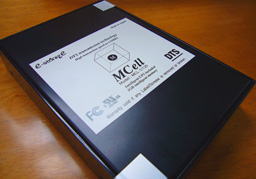From our news:
Hybrid hard drives are a welcomed innovation because they are low power and very efficient. However, as Ars Technica reports, there may be even better drives on the horizon. A company by the name of Mcell has produced a hard drive that includes a 1GB stick of DDR2 ram, essentially taking the place of the drives cache. By comparison, most standard high-end drives today utilize 16MB of cache, so the benefits of such a steep increase is evident.
The cool thing is that such a device takes up virtually no additional space inside of your PC. Inside a 3.5" enclosure would be a 2.5" drive and 1GB of DDR2 ram and also a special chip with a real-time OS and CPU. Although the drive would be rated for 5400RPM, the included RAM and efficient OS would effectively wipe out any potential bottlenecks. This is a strange but very interesting idea. I am looking forward to it actually being developed in larger quantities.
The cool thing is that such a device takes up virtually no additional space inside of your PC. Inside a 3.5" enclosure would be a 2.5" drive and 1GB of DDR2 ram and also a special chip with a real-time OS and CPU. Although the drive would be rated for 5400RPM, the included RAM and efficient OS would effectively wipe out any potential bottlenecks. This is a strange but very interesting idea. I am looking forward to it actually being developed in larger quantities.
<table align="center"><tbody><tr><td>
 </td></tr></tbody></table>
</td></tr></tbody></table>
The drive will initially be available in 80GB, 120GB, and 160GB sizes, with the 80GB model selling for ¥15,800 ($136.15). According to the drive's product page, it contains a "quick boot up option" as well as a "one-stop software failure option," although it's not entirely clear how the latter will work.
Source: Ars Technica

The drive will initially be available in 80GB, 120GB, and 160GB sizes, with the 80GB model selling for ¥15,800 ($136.15). According to the drive's product page, it contains a "quick boot up option" as well as a "one-stop software failure option," although it's not entirely clear how the latter will work.
Source: Ars Technica
